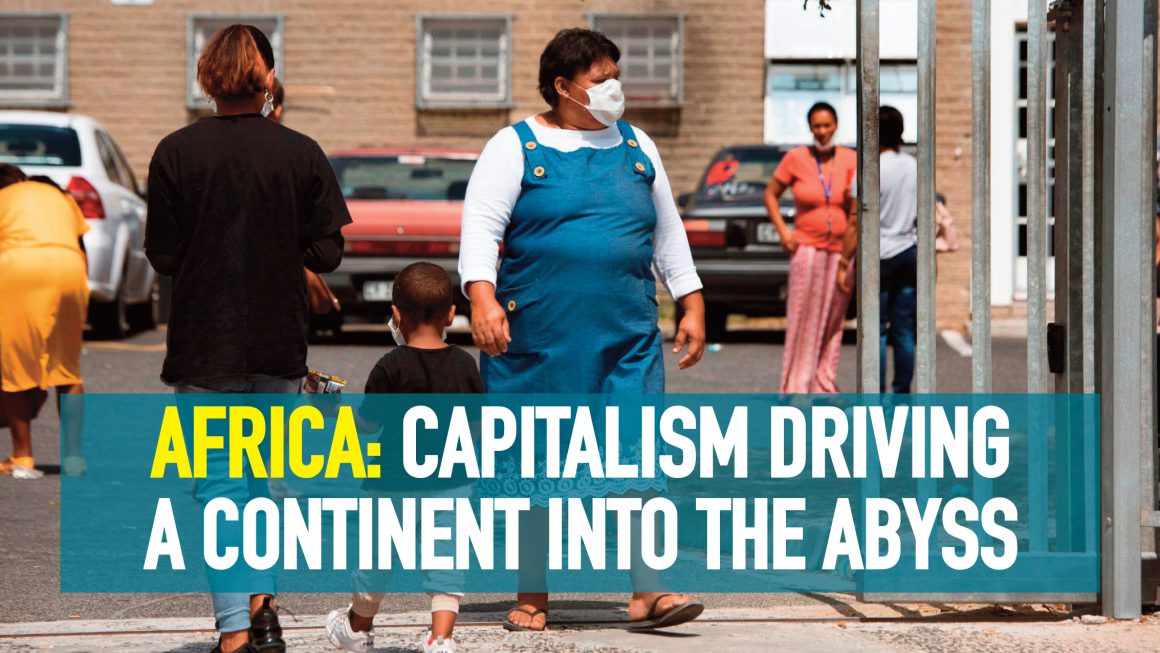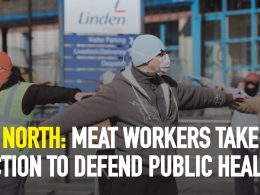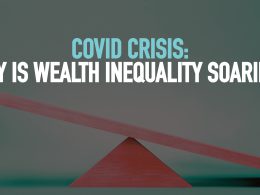By Serge Jordan, International Socialist Alternative (the international socialist organisation to which the Socialist Party is affiliated to)
The COVID-19 pandemic has thrown into sharp relief the profound social inequalities prevailing under modern capitalism. Nowhere more than in Africa.
The Global Health Security (GHS) Index is a measured assessment of 195 countries’ capacity and readiness to face outbreaks of infectious diseases. The majority of countries ranked as “least prepared” are located in Africa, with Somalia and Equatorial Guinea at the very bottom of the list. Only South Africa, already in the grip of a ballooning health and economic crisis, has a relatively high ranking — which serves to highlight how catastrophic the situation is throughout the rest of the continent.
A realistic assessment of the current penetration of the COVID-19 pandemic in Africa is made plainly impossible by the dearth of testing equipment in most countries. If South Africa currently has the highest number of confirmed cases in Sub-Saharan Africa, it is also where the most tests have been carried out. Some countries, like Somalia, do not have any testing kits at all. This means that undetected community transmission has already been making its way, off the radar, up and down the continent.
The word “inadequacy” to describe the state of the health infrastructure in Africa would be a grotesque understatement. A recent Lancet study of COVID-19 in West Africa noted that countries in the region have “poorly resourced health systems, rendering them unable to quickly scale up an epidemic response”, and that “a rapid acceleration in the number of cases could quickly overwhelm” the said systems. Malawi, for example, has 25 ICU beds for a population of 17 million people; in Somalia, 15 ICU beds are available for 15 million people. Zimbabwe has 7 ventilators for a population of 16 million, while the Central African Republic has a total of three ventilators for 5 million people. Sierra Leone and its 7.5 million inhabitants, just one.
The living conditions in working class and poor communities render the adoption of the necessary precautions to prevent the spread of the pandemic an inaccessible dream for many. Half of African city-dwellers live in overcrowded makeshift houses, slums and townships with inadequate water provision and sanitation.
The millions of refugees, asylum seekers and internally displaced people living in camps, informal settlements and detention centers -victims of wars, persecutions and environmental disasters — in the Sahel region, the Horn of Africa, the DRC and other places are particularly vulnerable to the risk of infection. South Sudan has recently reported its first cases of COVID-19. This is a country where more than half the population is facing severe food insecurity, where years of civil war have forced millions from their homes, and where only 22% of health facilities are functional. Libya and Burkina Faso have both been wrecked by wars that have, in the past year alone, displaced 200,000 and 700,000 people respectively. Both have experienced widespread damage to their health facilities; 135 health centers have closed due to violence in the latter country.
Malnutrition and infectious diseases are already commonplace across big parts of the continent. Africa deals with some of the highest infection levels of HIV, TB and malaria. Considering the under-resourced healthcare infrastructure facing most African countries, the limited means deployed towards countering COVID-19 will have a stalling effect on the struggle against these other deadly epidemics — as already observed by the halt put on research into infectious diseases and vaccination campaigns in many areas.
Capitalism and imperialism in the dock
The horrors that the development of the pandemic has in store for the African masses are in no way the manifestation of an inevitable, natural catastrophe. They have been prepared by decades of extreme looting and exploitation of the continent by colonial then neo-colonial imperialist powers, with the direct involvement and complicity of helplessly corrupt local ruling elites. This has translated, among other things, into dilapidated healthcare systems across the board, and endemic levels of abject poverty.
In reality, the resources do exist to deal with this crisis — they have simply been plundered by multinational corporations and banks, African bourgeois and despotic rulers. Outlining this reality, Oxfam wrote last year that “ECOWAS countries [West African States] lose an estimated $9.6 billion to corporate tax incentives for multinational companies. This would be enough to build about 100 modern and well-equipped hospitals each year in the region”.
At a time when African countries are in dire need of colossal investment to tackle this pandemic head-on, a colossal capital flight out of the continent is underway, already far exceeding the one that took place during the worldwide crisis of 2008 — both in speed and volume. Capital outflows from so-called emerging economies have totaled more than $83 billion in March, according to the International Institute of Finance. This is not some anecdotal mistake but exemplifies how the whole system operates, and illustrates the failure of the “free market” to harness the necessary response to the current humanitarian emergency. Only economic planning and the coordination of resources on a global scale could make such a response possible.
Putting an end to the looting of the continent, and expropriating the immense wealth syphoned off by the super rich, is nothing but a matter of life and death for millions of people. This would allow for redirecting resources towards funding emergency healthcare services, testing facilities, quarantine and isolation centres, medical equipment and trained personnel at the scale that the current situation requires.
It could certainly begin with imposing state controls on capital flows, and by canceling the massive debt burden under which many African states are crumbling. Nigeria, for example, spends close to two thirds of its income on debt servicing. In 17 African countries, the interest costs on the debt alone account for 10 percent or more of government revenues. A number of African states, like Zambia and Angola, are only one step away from default already, and more are likely to follow.
Under pressure, western governments have pumped in trillions of dollars to partially cushion the economic effects of the crisis in their own countries, and avoid the collapse of their system. Governments in Africa do not have the fiscal space to deploy similar bailout programs — having willingly contributed to the immense debt racket orchestrated by the most powerful imperialist nations, which has seen huge portions of the African states’ income transferred into the coffers of international financial creditors rather than being invested in healthcare, education, housing, public transports, infrastructure and people’s well-being in general.
Fearing the grinding revolt of the masses, the same African leaders are now pleading for help, in the form of debt suspensions, moratoriums and the like. David Malpass, the head of the World Bank, said he supports a “suspension” of all debt payments for the poorest countries — but added that these countries should also implement free-market policies, such as removing regulations and subsidies. The IMF, for its part, has provided a number of African governments with emergency loans. These loans come with the caveat that once the sanitary crisis abates, “fiscal adjustment”, containment of public payroll, further reduction in state subsidies and other austerity measures will have to be on the order of the day.
This attempt to continue holding entire populations to neo-liberal ransom in the midst of a deadly pandemic not only exposes these rapacious institutions for what they always were. Let us not forget that one of the direct consequences of the “Structural Adjustment Plans” imposed by the IMF and the World Bank following the debt crisis of the 1980’s, was the tearing apart of the existing health services in one African country after another. But it also underlines how much the fate of the masses of the entire region is tied up to a resolute struggle against the domination of world imperialism and its local agents on the continent — a struggle which should demand nothing less than the immediate and unconditional cancellation of all debt repayments, along with the nationalisation, under the democratic control of working people, of the multinational companies and banks, which have extracted a staggering amount of wealth from the African working classes while leaving human and ecological ruin behind them.
These policies will prove to be all the more necessary, and find increased resonance, as a scenario of economic devastation is unravelling across the whole continent. The rapidly accelerating global economic recession is indeed set to have particularly devastating consequences for the African masses. The World Bank recently predicted that Sub-saharan Africa would face its first recession in 25 years. The United Nations Development Programme (UNDP) issued a warning that nearly half of all jobs in Africa could be wiped out in this context. The contraction of the Chinese economy and the crash in oil and commodity prices are likely to precipitate economic collapse in a series of countries, with the biggest oil-exporting economies such as Nigeria and Angola in the immediate firing range.
The sudden fall in tourism as a result of the containment measures, travel bans and border closures adds to an already explosive mix. Around 24 million jobs depend on tourist activities across Africa, which in recent years had been among the fastest growing regions for tourism worldwide. This process is now being brutally reversed. The World Tourism Organisation predicts a fall of international tourism of between 20 and 30% (during the 2008 crisis, the fall in the sector was of about 4%). For many African countries, this will translate into a tsunami of job losses.
Lockdowns
In most African countries, lockdown regulations have been imposed to combat the spread of the virus. Absent a clear plan to address all the compelling social, economic and sanitary issues inherited from years of capitalist mismanagement and anti-poor policies, these lockdowns are mere plasters on open wounds. It is a way for governments to appear strong, at the same time as blaming ordinary people for spreading the infection.
Because of the huge number of workers entirely dependent on informal work for daily survival (over 80 per cent of adult Africans work in the informal sector), and the lack of well-planned relief measures for those in need, the lockdowns have stripped millions of people of their source of income overnight. In Kinshasa, the capital city of the DRC, a popular saying captures the dilemma faced by many working and poor people across Africa: “if you don’t go out, you don’t eat”. Hundreds of Tunisian protesters whose anger burst out in the streets of the impoverished neighbourhoods of Ettadhamen and Mnilha after a week of lockdown at the end of March, didn’t express anything different: “Let me bring bread to my children, no matter if I die” were the reported words of a casual building worker among them. This foreshadows the social explosions that this crisis will bring in its way.
The order to “self-isolate” practically stops street vendors, informal transport drivers, domestic workers, and many others from earning their daily bread, and constrains them to starve at home. It often prevents people from reaching markets for vital supplies and, in some cases, even from accessing communal water points.
To avoid being trapped in this cruel situation, many desperate migrant workers have tried to move out of the main cities back to the rural areas where they come from, hoping for a cheaper life in the countryside, where they still have family links in their villages or hometowns. Reuters reported on March 26 that “Travellers in African cities — from Nairobi to Kampala, Johannesburg and Rabat — are heading to the countryside, worrying officials who say this helped spread diseases like Ebola in other outbreaks.” This exodus undoubtedly spread the infection in places where healthcare provision is even worse than in the urban centres — if it exists at all. But, the responsibility for this situation should be squarely put at the door of the ruling classes, and their callous disregard for the lives and health of ordinary people.
Nothing illustrates this better than the brutality with which state forces have enforced lockdowns and curfews. As the days go by, the death toll from lockdown-related state killings, and the examples of police and military abuses and humiliating treatments, are mounting.
Bloomberg reported that two young men were shot and killed by the Rwandan police for violating the 14-day stay-at-home order from President Paul Kagame. In South Africa, eight people were killed as a result of police actions during the first week of the national lockdown; when reported, this figure was above the number of COVID-19 deaths. In Kenya, a 13-year-old boy playing on his balcony was killed by the police in the capital Nairobi, and at least three other people were killed in separate incidents. A Nigerian man was shot dead by a soldier in the southern city of Warri for flouting a stay-at-home order to buy medicine for his pregnant partner. In Zimbabwe, nearly 2,000 people were arrested during the first week of the lockdown. And the list goes on.
Gender-based violence from state forces have also been on the rise in this context, with reported cases of rapes by Rwandan soldiers and scores of LGBTQ+ people rounded up by the police in Uganda under the guise of coronavirus prevention.
Governments across Africa have reaffirmed the post-colonial arbitrary borders of their states by rapidly closing down ports of entry in a renewed push towards reactionary nationalism. South Africa allocated $2,1 million to the erection of a 40km fence along its border with Zimbabwe, even before any cases of COVID-19 were recorded there, to prevent “undocumented or infected persons” passing through the border without being screened for coronavirus. Xenophobic sentiments have also reared their heads among police, who are harassing immigrant shop owners after a minister falsely announced only South African owned shops will be allowed to stay open. Additionally, only 100% South African owned small business qualify for the financial relief the state has set in place, and undocumented workers are unable to claim from the unemployment insurance fund for loss of income.
In many other African countries, instances of racism against asian people have been reported, such as the widely-publicized video of a Chinese couple in Kenya being harassed by a big group of locals, backed up by a member of parliament condoning the practice of stoning any Chinese visitors if government did not do enough to combat COVID-19. In the Central African Republic, threats and violence against foreigners and the country’s Muslim minority have reportedly spiked in recent weeks, stoked by local reactionary tabloids blaming them for the infection.
As elsewhere, the ruling classes across Africa shamelessly exploit the spread of the coronavirus to boost the powers of their state machines, and to administer an expedient erosion of democratic rights. In Burkina Faso, once the coronavirus was officially declared in the country, the first target of the government measures were the trade union demonstrations, which had culminated into a 120 hours-long general strike in mid-March. Meanwhile, infected ministers and high officials continued to hold large rallies as part of their campaigns for the presidential elections planned in November! In Algeria, the ruling clique has hastily exploited a time when people cannot easily fill the streets in order to settle its scores with the revolutionary movement. Despite the pandemic, the courts have been working round the clock to sentence political activists and journalists critical of the regime.
A socialist action plan to resist the crisis
Working class communities and the labour movement across Africa need to organise without delay against such state harassment, repression and abuses, and resist any attempt to use the lockdowns to undermine democratic and trade union rights, the freedom of expression, etc. Arbitrary arrests and politically-motivated sackings of workers should be opposed, and all detained activists released.
But in the last instance, the growing violence of the state is a protrusion from the sharpening class divisions. If beatings and killings act as a means of “persuasion”, it is because the capitalist system the African ruling elites and their corrupt regimes are holding onto, has miserably failed the overwhelming majority in society. The interests of this majority have to be put center stage in the response to the looming catastrophe hanging over the continent.
The words of the Egyptian billionaire Naguib Sawiris, who urged the authorities to order people back to work “regardless of the consequences”, gives us a lens into the future if it is left in the hands of the capitalist class to decide. In Africa, like elsewhere, this parasitic oligarchy is ready to contemplate the death of hundreds of thousands of people so long as their profits take precedence. “Even if people get sick, they will recover”, he said. “It only kills 1 percent of patients, who are mostly elderly people”.
Beyond the economic misery they visit upon the poor, the lockdown and self-isolation measures make no sense if in sectors non-essential for the control of the pandemic, workers are forced (or forced back) to toil with no serious safety or social distancing measures in place, as is the case in Mali’s gold mines — while the number of infections is exponentially growing across the continent. The right of workers to stop production in all non-essential sectors, with guaranteed income, should hence be heralded — along with their right to democratically decide when and in which conditions production should restart. Every job loss or pay cut on account of the COVID-19 epidemic should be fought against, and all companies that retrench, fail to pay their workers or threaten with closure should be nationalised.
In the frontline sectors essential in the fight against the pandemic, workers should demand optimal sanitary equipment and procedures, life insurance coverage and special hazard pay for all those who continue to work. Thousands of nurses, doctors and other healthcare workers have already shown the way by striking to demand the provision of vital medical and personal protective equipment (PPE) in several African countries — most notably in Zimbabwe and in Kenya, where strikes for adequate staffing and equipment in the sector in the last years have been numerous.
Additionally, viable income grants should be provided to precarious and informal workers, the unemployed and all people forced to stay home and in need, along with the supply of free relief food, medicine and other essential items for those facing hunger and destitution. All rent payments, water, electricity and telephone bills should be suspended, and all housing evictions stopped. Price hikes on the back of the poorest should not be allowed either. In the Sudanese capital Khartoum, for example, it is reported that the price of face masks has increased tenfold. To counteract profiteering off the COVID-19 pandemic, price controls should be imposed on all products of basic necessity. The free distribution of face masks, hand sanitisers and soap should be demanded in all public spaces, workplaces and communities.
Private hospitals and other healthcare facilities, as well as those owned by senior army and state officials, should be brought under public ownership and democratic control of elected workers’ representatives, and free healthcare treatment should be guaranteed for all — including for refugees, asylum-seekers, IDPs and homeless people. Ambitious plans of public investment in medical infrastructure, including the building of local clinics and testing centres in all areas in need, should be immediately launched. Relevant factory units should be requisitioned and their tools converted to produce test kits, medical equipment and protective gear. Private water and electricity companies should be nationalised and clean water supplied for free to all households. Large-scale housing programs should be put in place to deal with the dire and enormous housing needs, and do away with overcrowding — an important factor for increased probability of infection.
Democratic self-organisation
In reality, fighting the impending COVID-19 disaster demands an internationally-coordinated emergency plan of action the likes of which the African capitalist elites and their Western counterparts are utterly incapable and unwilling to deliver. Unfortunately, in many cases the leaderships of the trade unions have fallen far short of what workers are correct to expect in a crisis of such historical proportions. While building pressure for unions, student organisations, social and community organisations to campaign for a joint struggle against the crisis, it will often be left to workers and youth to initiate the fight to obtain what they need. To that effect, democratic committees could be set up at the community and workplace level to organise and fight for the type of demands outlined above — as they simply won’t fall from the top.
In Algeria and Sudan, countries which have been rocked by mass revolutionary struggles since last year, steps have been taken in this direction: some of the popular and resistance committees have recalibrated their intervention to combat the COVID-19 pandemic, the economic crisis and its consequences. In Sudan, the local resistance committees which emerged last year as key drivers of the revolutionary movement are stepping in to try and fill the gap left by the ineptitudes of the capitalist state — conducting campaigns to raise public awareness of the virus, sanitising markets, bakeries, mosques, cafes… Similar examples have been seen in Algeria, where committees have been formed in some working class communities to organise food supply for the poor, centralise and distribute protective masks etc. If coordinated and their prerogatives extended, these committees can become a central pillar of a future mass resistance against the corrupt capitalist rulers, bosses and landlords, who will inevitably make the majority of the population pay for keeping their rotten and crisis-ridden system running.
By working hand-in-hand with healthcare workers and medical professionals, these committees can also lead campaigns to educate people about the science of COVID-19, and push back against the widespread misinformation, myths and conspiracy theories about the pandemic — such as the unscientific idea that dark-skinned people do not die from the virus, that the latter will not survive in warm weather, that test kits spread infection, and other “fake news”. The simmering anger against Western imperialism and local rulers across Africa have provided an open avenue for these theories, feeding on the long-established distrust vis-a-vis the ruling authorities and the “official” narrative. In Côte d’Ivoire, a newly built testing facility centre for COVID-19 in the capital Abidjan was even ransacked on April 6 by local residents, panicked that the disease could be brought into their communities.
Similar falsehoods have in some cases been criminally encouraged by African governments themselves, notably by making use of religious obscurantism to make up for their own policy failures. A statement from the government of Burundi said that the country “is an exception because it is a country that has put God first.” The President of Tanzania, John Magufuli, encouraged people to crowd into churches, since “coronavirus cannot survive in a church”. According to Zimbabwe’s defence minister, her country had been exempt from the virus because the disease was a divine retribution against the West for imposing sanctions on her government…
These regressive ideas are spread by sections of the African ruling classes to manipulate the fears among populations despairing as a result of the misery and barbarity unleashed by capitalist society. However, the COVID-19 pandemic delivers a new indictment of this society. It poses in a sharper way than ever before to the masses of the entire continent the urgent need to fight to “quarantine capitalism”, as the Workers and Socialist Party (ISA in South Africa) put it — and for a radical overhaul of how human society is run. As this disease is set to precipitate entire countries into untold levels of misery, disease, violence and death, it will also reaffirm in the eyes of millions the critical necessity to organise and fight for a socialist society: one under which the world’s natural, human and technological resources are publicly owned and democratically planned to satisfy the needs of the vast majority of the planet’s inhabitants.












